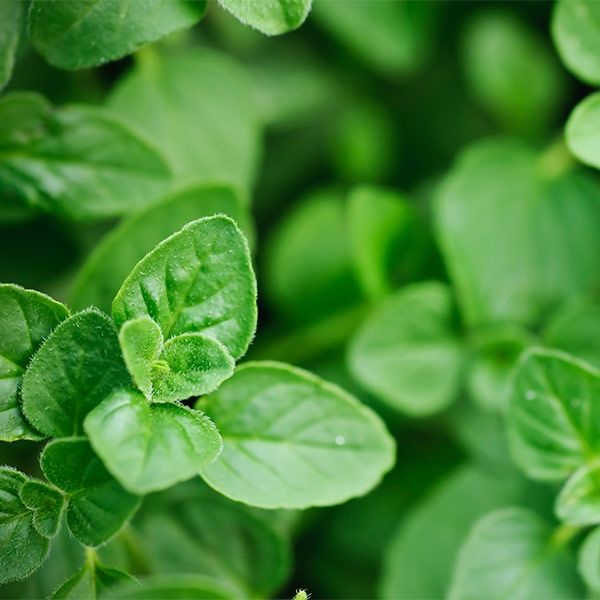Oregano Oil
The Many Benefits of Oregano Essential Oil
English Name: Oregano Oil
What is Oregano Oil?
Oregano oil is extracted from the leaves and shoots of the oregano plant, a flowering herb used for millennia as both a food flavoring and a homeopathic medicine. Species of oregano can now be found all over the world though it is native to the Mediterranean area. It thrives at higher altitudes, so the early Greeks made its name from words that translate as “delight of the mountains.” They would pack wounds with oregano to protect against infection, and the culinary use of oregano is legendary in Italian and other Mediterranean cuisines. Sometimes referred to as wild marjoram, oregano is closely related to both marjoram and mint. The tall, dark green perennial sprouts purple flowers in summer and prefers relatively dry climates, though it adapts to colder regions as an annual that does not survive the winter1.
How does Oregano Oil work?
The leaves of the oregano plant contain a high concentration of compounds with antioxidant, anti-fungal and anti-inflammatory properties. Most abundant in the plant is a phenol called carvacrol, a lab-tested antibacterial agent. Thymol is a phenol in oregano with antifungal properties, and rosmarinic acid is a powerful antioxidant that helps protect against the damage to our cells free radicals can cause. These three elements make up over 70 percent of the essential oil that is extracted from the oregano leaves2. The oil can be applied topically to target bacteria, fungi and joint inflammation, or it can be ingested for more systemic effects, especially in the digestive track. Because the antioxidant levels of oregano are so high — four times that of blueberries — and because essential oils are so concentrated, you can get the same level of benefit from a small volume of oil as from a large volume of fresh oregano3.
What are the benefits of Oregano Oil?
Oregano oil is effective against a range of harmful bacteria, like Staphylococcus aureus and E. coli, which quickly become antibiotic-resistant. It has shown particular effectiveness in alleviating urinary and respiratory infections, as its anti-inflammatory properties seem to soothe irritated throat and lung tissue and help expectorate phlegm3. From yeast infections to toe fungus, the thymol in oregano oil has proved effective in treating fungal infections both topically and internally. Studies have shown that ingesting oregano oil can help treat intestinal parasites, and applying it to the skin can help repel myriad pests, from mosquitos to head lice4.
Products Featuring Oregano Oil
For Humans:
Toenail Fungus Zapper™ for Healthy Toenails

Native Remedies recommends you consult your doctor before introducing new herbal products into your regimen. Always ensure you are buying high-quality, laboratory-tested supplements from a reputable supplier. At Native Remedies, we back all our products with a 100 percent money-back guarantee. If you’re not happy with your purchase after trying it for 30 days, simply send it back for a refund. Here’s to your good health!
The content provided is for informational purposes only. It is not a substitute for professional medical advice. If you have a health condition, please consult a medical professional and do not use this information to self-diagnose or self-treat.
Resources:
- Patel, Kiran. "11 Amazing Benefits & Uses of Oregano Essential Oil." Organic Facts. September 27, 2018. Accessed November 02, 2018. https://www.organicfacts.net/health-benefits/essential-oils/health-benefits-of-oregano-essential-oil.html.
- Gavura, Scott. "Oil of Oregano." Science-Based Medicine. May 26, 2011. Accessed November 02, 2018. https://sciencebasedmedicine.org/oil-of-oregano/.
- Rowles, Alexandra. "9 Benefits and Uses of Oregano Oil." Healthline. June 16, 2017. Accessed November 2, 2018. https://www.healthline.com/nutrition/9-oregano-oil-benefits-and-uses.
- Force, M., W. S. Sparks, and R. A. Ronzio. "Inhibition of Enteric Parasites by Emulsified Oil of Oregano in Vivo." Phytotherapy Research : PTR. May 2000. Accessed November 02, 2018. https://www.ncbi.nlm.nih.gov/pubmed/10815019.
Reviewed by Master Herbalist, Mary Ellen Kosanke
